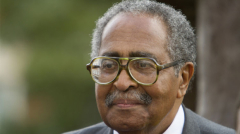 RALEIGH, N.C. (AP) — Franklin McCain, who helped spark a movement of nonviolent sit-in protests across the South by occupying a segregated Woolworth’s lunch counter in 1960, has died, his son said Friday. He was 73.
RALEIGH, N.C. (AP) — Franklin McCain, who helped spark a movement of nonviolent sit-in protests across the South by occupying a segregated Woolworth’s lunch counter in 1960, has died, his son said Friday. He was 73.
McCain died of respiratory complications late Thursday, Frank McCain of Greensboro said Friday.
Franklin McCain was one of four freshmen students from North Carolina A&T State University in Greensboro who sat down at the local “whites only” lunch counter on Feb. 1, 1960.
“The best feeling of my life,” McCain said in a 2010 interview with The Associated Press, was “sitting on that dumb stool.”
“I felt so relieved,” he added. “I felt so at peace and so self-accepted at that very moment. Nothing has ever happened to me since then that topped that good feeling of being clean and fully accepted and feeling proud of me.”
McCain, Joseph McNeil, David Richmond and Ezell Blair Jr. (now known as Jibreel Khazan) planned their surprise action carefully. They bought school supplies and toiletries so that their receipts would offer proof that the lunch counter was the only part of the store where racial segregation still ruled.
The young men stayed until the store closed, but returned the next day and subsequent days. They were joined by more protesters, whose numbers built to at least 1,000 by the fifth day. Within weeks, sit-ins launched in more than 50 cities in nine states. The Woolworth’s lunch counter in Greensboro was desegregated within six months.
The sit-in led to the formation in Raleigh of the Student Nonviolent Coordinating Committee, which became the cutting edge of the student direct-action civil rights movement. The demonstrations between 1960 and 1965 helped pass the 1964 Civil Rights Act and the 1965 Voting Rights Act.
“To the world, he was a civil rights pioneer who, along with his three classmates, dared to make a difference by starting the sit-in movement,” McCain’s family said in a prepared statement. “To us, he was ‘Daddy’ – a man who deeply loved his family and cherished his friends.”
McCain graduated in 1964, became a research chemist and sales executive, and moved to Charlotte. His wife of 48 years, Bettye, died a year ago. He served on his alma mater’s board of trustees, then spent four years on the governing board of the 17-campus University of North Carolina system. His term on the public university board ended last year.
“What I think people should remember most about Franklin is that his courage and commitment to doing what was right didn’t end at Woolworth’s,” said state university system president Tom Ross, who grew up in Greensboro. “That commitment continued throughout his life, and he channeled it in ways that really mattered, particularly in his service and devotion to our university and to higher education.”
Richmond died in 1990. McNeil is now 71 and Khazan is 72, said Steffany Reeve, a spokeswoman for the International Civil Rights Center and Museum, which occupies the former Woolworth’s store.



